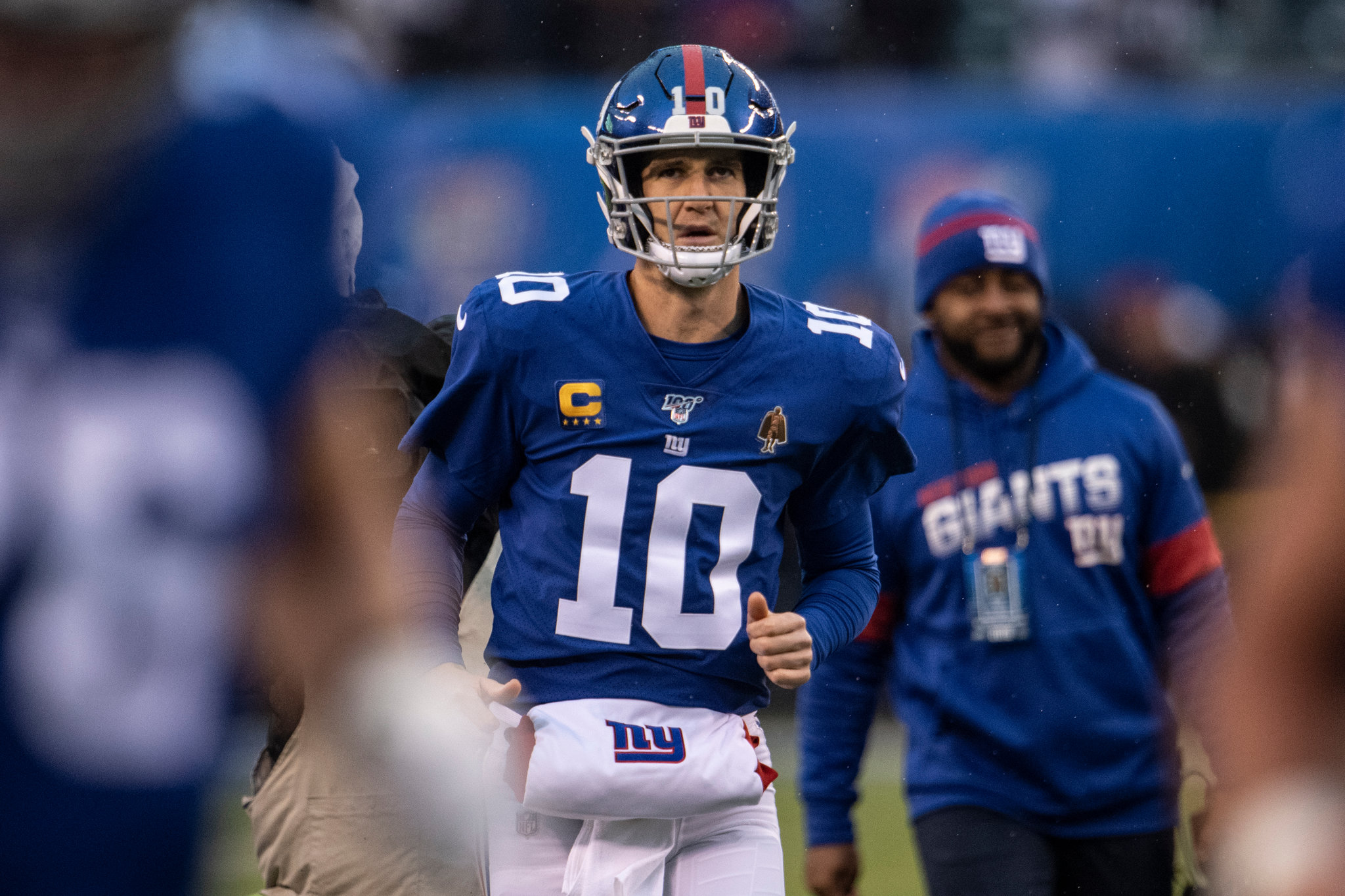Eli Manning’s Retirement: A Legendary Quarterback Hangs up his Helmet
As the curtains closed on his remarkable NFL career, Eli Manning bid adieu to the football field alongside a legacy that will forever be etched in the annals of the sport’s history. The veteran quarterback announced his retirement on January 22, 2020, marking the end of an era for both the New York Giants and football fans worldwide.
Manning’s retirement comes as no surprise, given his dwindling playing time over the past couple of seasons. Having spent his entire illustrious 16-year career with the Giants, he established himself as a true icon of the franchise, delivering moments of sheer brilliance and achieving remarkable milestones along the way.
Born on January 3, 1981, in New Orleans, Louisiana, Manning grew up in a family deeply ingrained in football. His father, Archie Manning, was a former NFL quarterback, and his older brother, Peyton Manning, remains one of the greatest quarterbacks of all time. Eli Manning’s retirement thus marked the end of an era for the Manning family dynasty in professional football.
Entering the league as the first overall pick in the 2004 NFL Draft, Manning joined the Giants with high expectations. However, it was his unwavering resilience, poise under pressure, and knack for delivering in clutch moments that truly distinguished him as a noteworthy quarterback. His achievements include winning two Super Bowls, both against the formidable New England Patriots, and being named the Most Valuable Player of both those championship games.
Manning’s impact extended beyond his on-field heroics. Known for his affable personality and unwavering commitment to his team, he became a beacon of stability for the Giants’ franchise, leading them through numerous ups and downs. His leadership qualities and approachability made him a beloved figure among teammates, coaches, and fans alike.
The decision to retire was a poignant moment for Manning, acknowledging the reality that his body had endured enough and that a new chapter awaited him. In his retirement statement, he expressed his gratitude towards the Giants organization, his family, teammates, and fans who supported him throughout his remarkable journey. Manning’s class and humility left a lasting impression on the football community, cementing his status as not just an exceptional athlete, but also a role model for aspiring players.
With his playing days behind him, Manning transitions into the next phase of his life—an ambassador for the game he loves so dearly. His retirement paves the way for reflection on his outstanding career and the impact he left on the sport. Manning’s name will now forever be associated with grit, determination, and the ability to rise to the occasion when it mattered the most.
As we bid farewell to Eli Manning, we celebrate his legacy and the countless memories he graced us with. The retirement of such an extraordinary quarterback marks the end of an era, leaving behind a void that will be difficult to fill. Nevertheless, Manning’s indomitable spirit and contributions to the game will continue to inspire generations to come for years to follow.
More About : When Did Eli Manning Retire
Introduction:
Over the course of his illustrious career, Eli Manning emerged as one of the most accomplished quarterbacks in the NFL. After 16 seasons with the New York Giants, he ultimately announced his retirement from professional football on January 22, 2020. Manning’s retirement marked the end of an era for both the Giants and the league, as he left an indelible mark on the sport with his exceptional performances, unparalleled leadership, and remarkable achievements.
1. Early Life and Career Beginnings:
– Eli Manning was born on January 3, 1981, in New Orleans, Louisiana, into a family synonymous with football. His father, Archie Manning, was a former NFL quarterback, while his older brother, Peyton Manning, went on to become a legendary quarterback in his own right.
– Eli’s passion for football was evident from a young age, and he excelled at both high school and college levels. Playing for the University of Mississippi, he showcased his skills, earning numerous accolades and setting multiple school records.
2. NFL Draft and Early Success:
– In the 2004 NFL Draft, Eli Manning was selected as the first overall pick by the San Diego Chargers. However, shortly after the draft, a blockbuster trade occurred, sending Manning to the New York Giants.
– Manning faced initial challenges when he became the Giants’ starting quarterback in 2004, but he steadily improved and showcased his potential. He demonstrated exceptional resilience and maturity under pressure throughout his career.
3. Super Bowl Triumphs and MVP Honors:
– One of the highlights of Manning’s career came in Super Bowl XLII, where he led the Giants to a stunning victory over the previously undefeated New England Patriots. His touchdown pass to Plaxico Burress in the final minutes of the game sealed a historic upset, earning Manning his first Super Bowl ring and the game’s MVP award.
– Manning’s second Super Bowl victory came in Super Bowl XLVI, again against the Patriots. This time, he orchestrated another thrilling victory, showcasing his exceptional skills and clutch performances in crucial moments.
4. Records and Achievements:
– Throughout his career, Manning set numerous franchise and league records. He holds the Giants’ records for career passing yards, touchdown passes, and completions. Additionally, he ranks seventh all-time in career passing yards and passing touchdowns in the NFL.
– Manning was named to the Pro Bowl four times, further highlighting his consistent performances and recognition among his peers.
5. Leadership and Off-Field Contributions:
– Apart from his on-field achievements, Manning was revered for his exceptional leadership qualities, often described as a true gentleman and a role model both on and off the field.
– He made significant philanthropic contributions, using his platform to make a positive impact on the lives of others. Manning’s dedication to charitable causes earned him the prestigious Walter Payton NFL Man of the Year Award in 2016.
Conclusion:
Eli Manning’s retirement from professional football in 2020 marked the end of an era for the New York Giants and the NFL. Throughout his career, Manning showcased his exceptional skills, leadership qualities, and remarkable achievements. With two Super Bowl victories, multiple records, and a reputation as a true gentleman of the sport, Manning leaves a lasting legacy as one of the finest quarterbacks to grace the gridiron. His contributions to the game and his off-field philanthropic efforts will continue to inspire future generations of football players and fans alike.
FAQs on When Did Eli Manning Retire
Q: When did Eli Manning retire?
A: Eli Manning officially retired from professional football on January 22, 2020.
Q: Why did Eli Manning decide to retire?
A: Manning chose to retire after playing 16 seasons in the NFL because he believed it was the right time to step away from the game and start a new chapter in his life.
Q: How old was Eli Manning when he retired?
A: Eli Manning retired at the age of 39.
Q: How long did Eli Manning play for the New York Giants?
A: Manning played his entire NFL career of 16 seasons with the New York Giants.
Q: Did Eli Manning win any Super Bowls?
A: Yes, Eli Manning won two Super Bowls during his career. He led the Giants to victory in Super Bowl XLII in 2008 and Super Bowl XLVI in 2012.
Q: What were Eli Manning’s career statistics?
A: Throughout his career, Manning amassed 57,023 passing yards, threw 366 touchdowns, and had a passer rating of 84.1.
Q: Was Eli Manning considered one of the greatest quarterbacks of all time?
A: While opinions on individual greatness may vary, Manning is highly regarded as one of the greatest quarterbacks in New York Giants history and was widely respected for his leadership and performances in clutch moments.
Q: What is Eli Manning doing after retirement?
A: After retiring from football, Manning has spent time focusing on his family and pursuing various business ventures. He has also been involved in philanthropic activities and continues to be connected to the sport through media appearances.
Q: Will Eli Manning be inducted into the Pro Football Hall of Fame?
A: While it is ultimately up to the selection committee, Manning’s career accomplishments, including winning two Super Bowls, his durability, and his numerous Giants franchise records, make him a strong candidate for induction into the Pro Football Hall of Fame.
Q: Did Eli Manning receive any awards or accolades during his career?
A: Yes, Manning received several accolades throughout his career, including being named the Super Bowl MVP twice, making four Pro Bowl appearances, and winning the Walter Payton NFL Man of the Year award in 2016.




